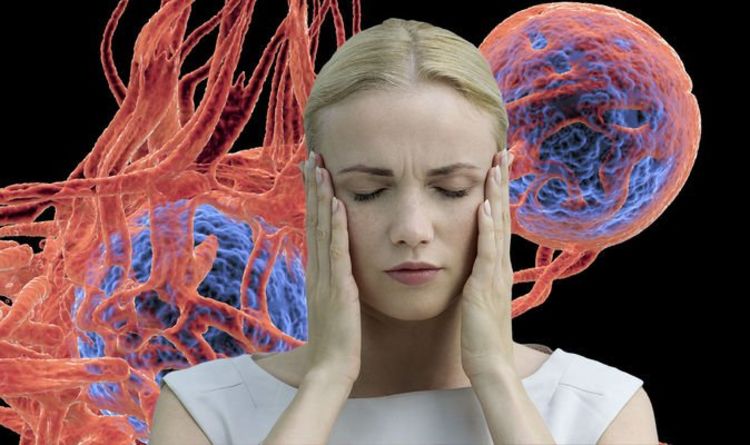Dr Chris discusses CT scans detecting lung cancer
We use your sign-up to provide content in ways you’ve consented to and to improve our understanding of you. This may include adverts from us and 3rd parties based on our understanding. You can unsubscribe at any time. More info
Cancer patients have massively taken the brunt of coronavirus disruptions, and researchers have voiced their concerns that survival rates could soon recede. Fortunately, the condition remains highly survival when picked up in the initial stages. The symptoms of the condition, however, can be wide-ranging and ill-defined. One sign of lung cancer can appear in the face, upon waking up.
Tumour growth can initiate anywhere in the body, so it’s only natural that each form of the disease has its own set of symptoms.
Lung cancer, the third most common type of cancer in the UK, is most generally associated with a persistent cough.
Occasionally, however, patients present with symptoms on the face, according to Compass Oncology.
The health body says: “As lung cancer spreads, it sometimes generate tumours that restrict the large vein that carries blood away from the head and arms, back to the heart.
READ MORE: Cancer: The activity you can do every day to help prevent the deadly disease

“When this happens, blood flow slows causing blood to back up in the veins.
“The excess fluid may cause the face, neck, upper chest and arms to swell.”
The health body explains that this accumulation of fluids can also lead to discolouration in the upper body.
It continues: “The skin in these areas may also take on a blueish red hue.
“Swelling can develop quickly or slowly. However, an early symptom may be facial or eye swelling first thing in the morning.
“If you have explained swelling that doesn’t go away on its own then you should talk with your doctor.”
Lung cancer was listed by the Less Survivable Cancers Taskforce as one of the less survivable forms of the disease earlier this month, alongside cancer of the liver, brain oesophageal, pancreatic and stomach.
What’s more, these cancers, make up half of all common cancer deaths in the UK.

Anna Jewell, Chair of the task force, said: “We know that delays in diagnosis lead to much poorer outcomes for a patient with […] rapidly-advancing cancers.
“These cancers are currently difficult or impossible to treat at later stages and the time from diagnosis to death is often brutally short compared to more survivable cancers.
“The situation is critical and has been exacerbated by the COVID-19 pandemic.”
The average five-year survival rate for these cancers is 16 percent, according to the health watchdog.

Cancer prevention
The most essential rule in cancer prevention is arguably avoiding tobacco in all its forms, including exposure to secondhand smoke.
But lung cancer can also be caused by chemical fumes, so avoiding exposure to hazardous substances is also important.
Limiting radiation to the chest will stop radioactive waves from damaging DNA and increasing the risk of cancer.
Finally, eating properly, exercising and exercising regularly are equally important in the prevention of cancer.
Source: Read Full Article
